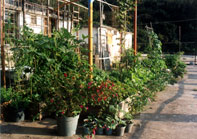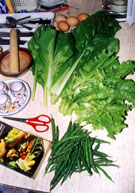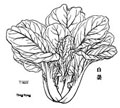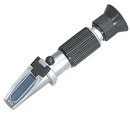
![]()
Search the Journey to Forever website – click HERE
|
Journey to Forever: Make a donation |
Navigation
| Small farms library | |
| City farms | |
| Organic gardening | |
| Journey to Forever organic garden Handmade soil Village development |
|
| Why organic? | |
| Do it for selfish reasons No pesticides Food quality |
|
| Building a square foot garden | |
| Where to build it Is the soil fertile enough? Raised beds and double-digging The lazy way Paths The sides Sizes and shapes Trellises Cement Soil No compost? |
|
| Plant spacing guides | |
| No ground? Use containers | |
| Container gardening guide Resources |
|
| When to sow what | |
| Sowing times for different regions Seed sowing and harvesting times for Hong Kong Vegetable Garden Calendar for Hong Kong |
|
| Seeds | |
| Catalogs Supplies Herbs Hong Kong |
|
| Garden pond | |
| Pond resources | |
| Gardening resources | |
| Organics resources | |
| Square foot gardens | |
| Companion planting | |
| How much to grow? | |
| General gardening | |
| Herbs | |
| Composting | |
| Small farms | |
Contact usTo Keith Addison Handmade Projects |
Why organic?
Never mind all the high ideals: do it for selfish reasons. Some people say: "But it's so much more trouble." In fact it's so much less trouble to work with nature than to fight it. Why turn your garden into a battleground -- a battle you can't possibly win? And why poison your food?
-- "We abuse the land because we regard it as a commodity belonging to us. When we see land as a community to which we belong, we may begin to use it with love and respect." -- Aldo Leopold, author of the environmental classic "Sand County Almanac"
And when you apply that lesson in your garden, lo and behold, nature suddenly becomes your friend and ally, doing most of the work for you. Rotenone is a safe and effective organic insecticide (biocide, pesticide) derived from derris roots, used by traditional societies in the east for centuries and approved for use by all organic associations. The effects are not persistent, it is biodegradeable and breaks down quickly into harmless by-products, and it is harmless to birds and mammals. In these days of successive food scares, food quality and food safety are prime reasons for growing your own: you use good seeds, and you know there are no toxic residues in your crops. But how do you measure quality?
What about pests? Don't you need pest-killers? "The pests are my professors," famously wrote Sir Albert Howard, founding father of the organics movement -- pest attack simply showed him where the soil fertility needed attention. He'd fix it, the pests would vanish. Not just a fairytale -- any good organic grower will confirm it.

Sir Albert Howard
It's not just "muck and magic", it's a lot more scientific than trying to kill everything with deadly poisons -- including beneficial predators that kill pests. Healthy plants have good resistance to pests (like healthy people), but they have to be well-fed for that (also like people), and they get their food from the soil (again like people). If it's not in the soil, the plants won't be healthy (and nor will the people). So feed the soil.
The essence of organic growing is soil management and fertility maintenance: feed the soil, not the plant -- the soil will feed the plant very much better than you can.
Weeds? What's a weed? Same as a pest really: an expert can diagnose an ailing soil's deficiencies and imbalances merely by seeing what weeds are growing in it. They're there for a purpose, well summed-up in the title of a wise book called Weeds -- Guardians of the Soil by Joseph Cocannouer.
Fighting weeds is futile. Some grow to cover an exposed soil that's vulnerable to erosion and run-off -- nature hates exposed soil.
So cover it yourself, with a mulch.

The Journey to Forever garden
Other weeds are deep-rooting plants that go down to the subsoil to collect fresh minerals when the topsoil runs out of them. Composting will fix that -- but leave some of the deep-rooting weeds (herbs actually) growing here and there to open up the soil, your vegetables will appreciate it (so will the earthworms). But they're stealing soil nutrients from your plants? Then your soil is in a bad way! -- certainly not fertile enough for vegetables. Believe the weeds! Tend to the soil and they'll stop pestering you, they'll be easy to manage.
No pesticides
But most organic growers don't use it: less than 6% of the respondents to a US Department of Agriculture survey of certified organic vegetable growers reported using rotenone (American Journal of Alternative Agriculture, Vol. 13, No. 2, 1998).
"I don't think we are unique among experienced organic growers in using very little intervention in pest management." (Organic grower, US)
"I, too, use no biocides. People who think you have to use biocides to farm assume incorrectly that organic farmers use botanical biocides. This is not the case. Very few organic farmers merely switch from synthetic to organic biocides. For some this may be a first step in the transition to organic growing, but it is not the rule. Organic farmers have shown that food crops can be grown with the same or more production per acre, with the same or less lost to pests, without using biocides or NPK (chemical) fertilizers." (Organic grower, US)
-- "Pesticides are the badge of the amateur" -- organic grower
Food quality
"Nothing beats the fresh taste," says Britain's HDRA organics association. "You can grow for flavour. Commercial growers have to grow for shelf-life."
Keith once visited the HDRA's headquarters at Ryton Gardens in Coventry with a graphic designer, who was there to work, not because he was interested in organics. We had lunch at the HDRA's restaurant, supplied with fresh food from the organic demonstration gardens, and that's when it hit him: he couldn't believe the flavour.

Fresh crops from the Beach House garden on the kitchen table
"I haven't tasted food like this since I was a child," he said. "I thought it was because I'd lost my sense of taste as I got older."
Visitors say similar things when they eat food from our garden. Flavour is a good measure of overall quality -- it's a subjective measure, but it's backed by evidence.
"Study Finds Far Less Pesticide Residue on Organic Produce", New York Times, May 8, 2002 -- The first detailed scientific analysis of organic fruits and vegetables, published today, shows that they contain a third as many pesticide residues as conventionally grown foods.
http://www.nytimes.com/2002/05/08/science/08PEST.html?
ex=1065240000&en=70dacc40e18ace2b&ei=5070
The report: "Pesticide residues in conventional, IPM-grown and organic foods: Insights from three U.S. data sets", by Brian P. Baker, Charles M. Benbrook, Edward Groth III, and Karen Lutz Benbrook, published in Food Additives and Contaminants, Volume 19, No. 5, May 2002, pages 427-446. 10 tables, 39 references.
Brix levels
Refractometers are simple, hand-held optical instruments that measure the percentage of sugar in plant juices (the "Brix" level) -- you put a leaf in a garlic crusher, squeeze some juice out onto the prism, and hold it up to the light to get the percentage.
A plant's mineral and protein content, and protein quality, are directly related to the sugar content in the sap. So the refractometer is a reliable, quick and cheap quality test. It's also been shown that plants with high sugar levels are much less prone to pest attack -- healthy plants have good resistance. And they taste better! (See No sugar for more on Brix and food quality.)
Standard sugar levels have been worked out for most crops, ranging from "Poor" to "Excellent" (see full chart here). Here are some readings taken in Hong Kong (1996):
Standard Brix levels
--
Poor
Average
Good
Excellent
Cabbage crops, beet, etc
6%
8%
10%
12%
Lettuce
4%
6%
8%
10%
Mui Wo market January 2000

Kai laan choi -- Chinese kale (Geoffrey Herklots)
Baak choi (Chinese white cabbage) 3%
Kai laan choi (Chinese kale) 5%
Choi sum (flowering Chinese cabbage) 5%
Lettuce 3%
Hong Kong supermarket January 2000
Baak choi (Chinese white cabbage) 5.5%
Choi sum (flowering Chinese cabbage) 5.5%
Kai laan tsoi (Chinese kale) 7%
Pearl River Delta, Guangdong January 2000
Celery cabbage (Chi hi li) 3%
Traditional Chinese farms, Lantau Island (average)
Baak choi (Chinese white cabbage) 1.5--2.5%
Choi sum (flowering Chinese cabbage) 2--3%
Private gardens in Lantau, Hong Kong
Garden #1
No chemicals used, poor soil maintenance, no composting

Baak choi -- Chinese white cabbage (Geoffrey Herklots)
Baak choi (Chinese white cabbage) 2.5%
Choi sum (flowering Chinese cabbage) 2%
Garden #2
No chemicals used, poor soil maintenance, small amounts of poor-quality compost used
Baak choi (Chinese white cabbage) 3.5%
Choi sum (flowering Chinese cabbage) 3%
Journey to Forever garden January 2000
Baak choi (Chinese white cabbage) 11%
Kai laan choi (Chinese kale) 12.5%
Silver beet 9.5%
Don't think it's just Hong Kong that has poor vegetables. We've found similar results in London, Plymouth, Glasgow, Amsterdam, Stockholm, New York, Cape Town, Johannesburg, Tokyo, Osaka, and we forget where else. Commercial vegetables are poor quality -- and usually not even that. Seldom do they rate "average", rarely "good".
And that's the best reason to grow your own.
See also: The case for organics: Scientific studies and reports
City farms
Organic gardening
Why organic?
Building a square foot garden
Plant spacing guides
No ground? Use containers
When to sow what
Seeds
Garden pond
Gardening resources
Composting
Making compost
Composting resources
Composting indoors
Vermicomposting
Humanure
Composting for small farms
Small farms
Small farm resources
Community-supported farms
Farming with trees
Farming with animals
Pasture
Pigs for small farms
Poultry for small farms
Aquaculture for small farms
Composting for small farms
Controlling weeds and pests
Small farms library
